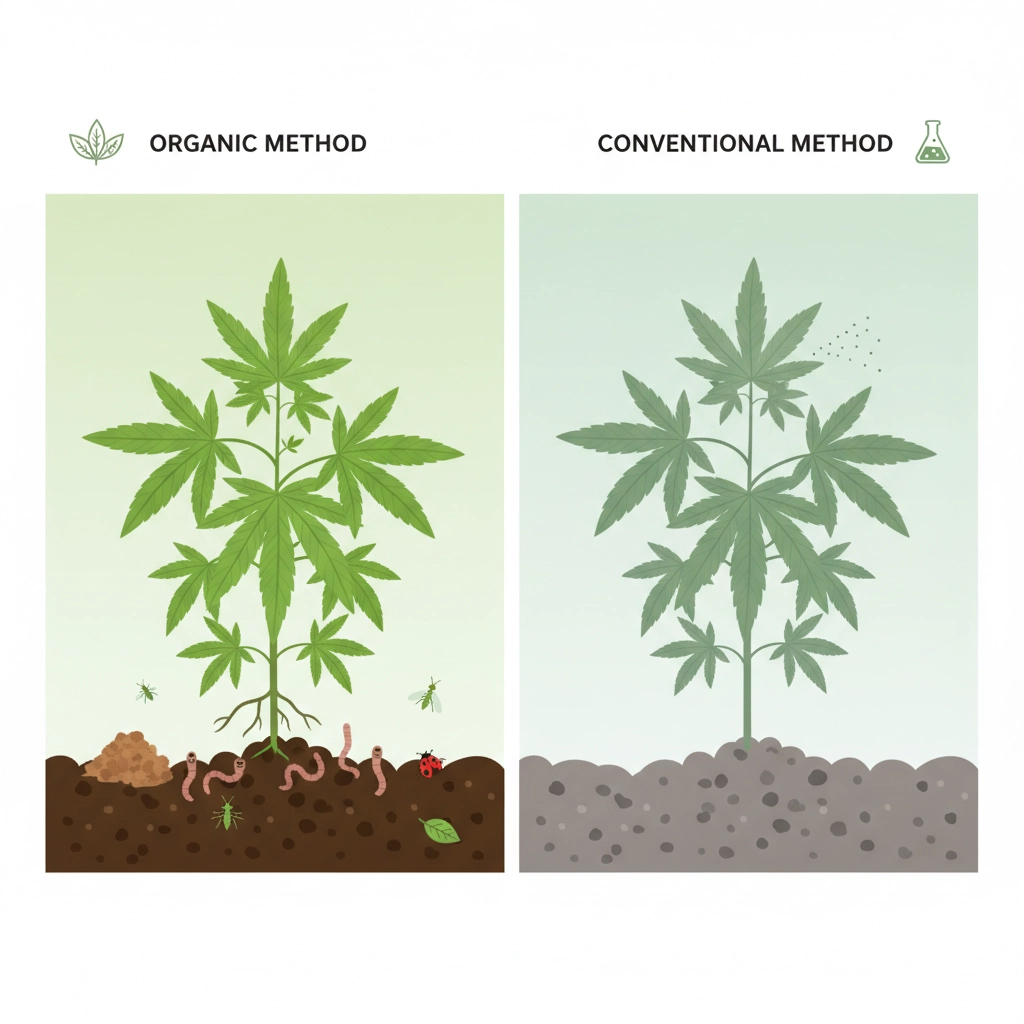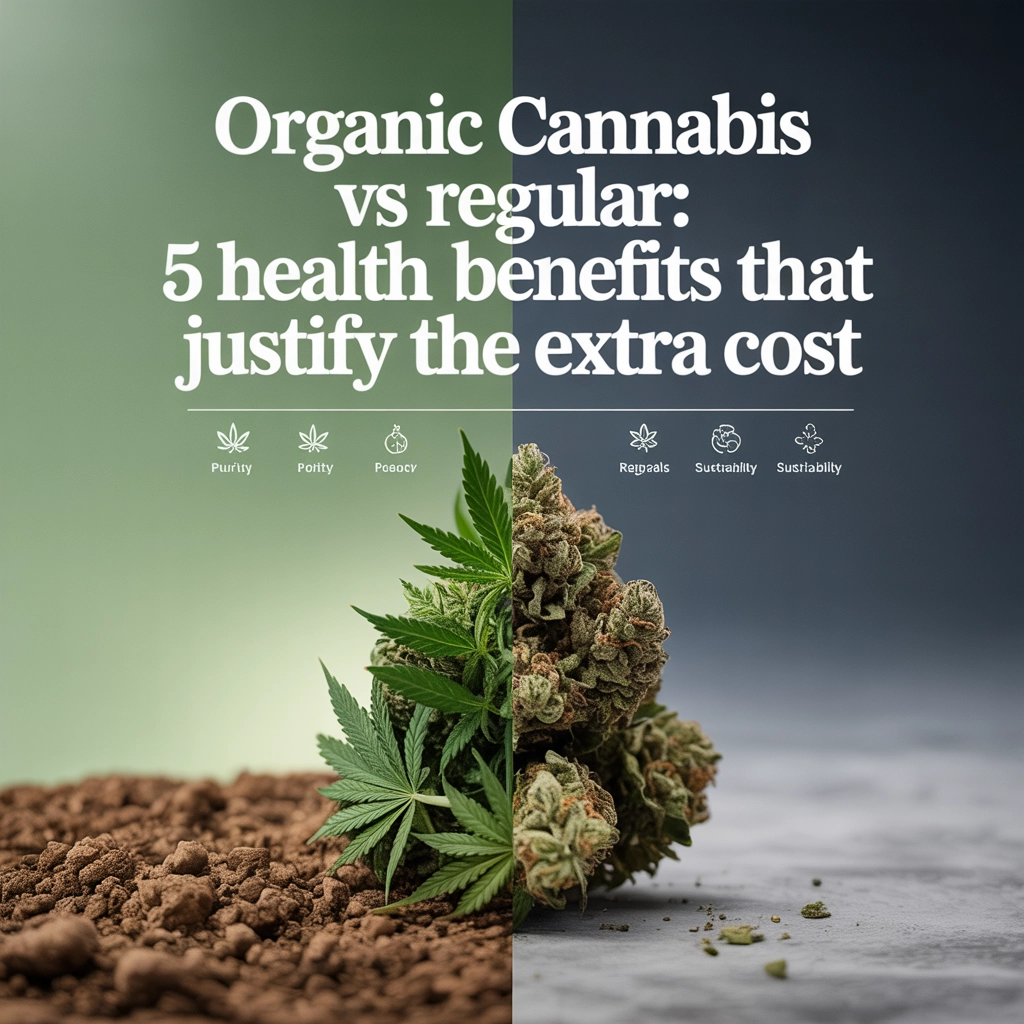The cannabis industry continues to evolve with increasing consumer awareness regarding cultivation methods and product quality. Organic cannabis typically commands a premium of 20-30% over conventionally grown varieties, yet this price differential reflects significant differences in cultivation practices, product purity, and potential health outcomes. Understanding these distinctions enables consumers to make informed decisions regarding their cannabis purchases and consumption patterns.
At Groth Industries, we recognize the importance of transparent information regarding cultivation methods and their impact on product quality. The following analysis examines five distinct health benefits associated with organic cannabis that justify the additional investment for many consumers, particularly those utilizing cannabis for therapeutic purposes.
Chemical Residue Elimination Through Organic Cultivation
Conventional cannabis cultivation frequently employs synthetic pesticides, herbicides, and chemical fertilizers to maximize yield and manage plant health challenges. These synthetic compounds can persist in the final product, creating potential exposure risks for consumers who inhale, ingest, or otherwise consume these substances regularly. Laboratory testing consistently demonstrates that conventionally grown cannabis may contain measurable residues of these synthetic chemicals.

Organic cultivation methods eliminate synthetic chemical inputs entirely, relying instead on natural fertilizers derived from composted organic matter, beneficial microorganisms, and integrated pest management strategies that utilize biological controls rather than synthetic pesticides. This approach ensures that the final cannabis product contains no synthetic chemical residues that could potentially impact consumer health.
Medical cannabis patients who consume cannabis products daily or multiple times per day face particular exposure concerns regarding synthetic chemical residues. The elimination of these substances through organic cultivation methods provides a measurably safer consumption experience, particularly for individuals with compromised immune systems or those seeking to minimize their overall chemical exposure burden.
Enhanced Cannabinoid and Terpene Development
Organic growing methods create optimal conditions for cannabis plants to develop their full genetic potential regarding cannabinoid and terpene production. The complex soil ecosystem maintained through organic practices provides essential micronutrients including chlorine, cobalt, nickel, and sodium that contribute to superior plant metabolism and compound synthesis. These trace elements, naturally occurring in organic soil environments, support the biosynthetic pathways that produce therapeutic cannabinoids and aromatic terpenes.
The enhanced terpene profiles observed in organic cannabis extend beyond mere flavor considerations. Terpenes function as active therapeutic compounds that modulate the effects of cannabinoids through the entourage effect, a phenomenon wherein multiple cannabis compounds work synergistically to enhance therapeutic outcomes. Organic cultivation consistently produces cannabis with more diverse and concentrated terpene profiles compared to conventional growing methods.
Laboratory analysis demonstrates that organic cannabis frequently exhibits higher concentrations of primary cannabinoids including THC and CBD, as well as minor cannabinoids such as CBG, CBC, and CBN. This enhanced cannabinoid density translates directly into more potent therapeutic effects per unit of consumed cannabis, effectively improving the cost-effectiveness of organic varieties despite their higher purchase price.
Superior Flavor Profiles and Consumption Experience

Organic cannabis delivers distinctly cleaner taste profiles and more pronounced natural flavors compared to conventionally grown varieties. Plants cultivated in nutrient-rich organic soil environments develop terpenes and flavonoids more comprehensively, resulting in products with intense, authentic flavor expressions that accurately represent the genetic characteristics of specific cannabis strains.
The absence of synthetic additives and chemical residues eliminates the harsh, artificial tastes frequently associated with conventional cannabis products. Consumers report that organic cannabis provides smoother inhalation experiences with reduced throat irritation and coughing, particularly when vaporized or smoked. This improved consumption experience encourages more precise dosing and greater user satisfaction.
The authentic flavor profiles maintained through organic cultivation also support strain identification and consistency. Consumers can reliably distinguish between different organic cannabis varieties based on their distinct terpene expressions, enabling more informed selection of products that align with desired effects and preferences.
Increased Therapeutic Potency and Consistency
Organic cultivation methods consistently produce cannabis with superior therapeutic effectiveness compared to conventional alternatives. The optimized growing environment allows plants to reach their full genetic potential, maximizing the production of flavonoids, terpenoids, and cannabinoids that contribute to therapeutic efficacy. This comprehensive compound development results in more effective medical cannabis products that provide reliable symptom relief.
The stable growing conditions maintained through organic practices also contribute to greater batch-to-batch consistency in cannabinoid profiles. Medical cannabis patients benefit significantly from this consistency, as it enables accurate dosing calculations and predictable therapeutic responses. The reliability of organic cannabis effects reduces the trial-and-error period often associated with finding effective cannabis products.
Enhanced potency characteristics of organic cannabis mean that consumers typically require smaller quantities to achieve desired therapeutic or recreational effects. This increased efficiency can offset the higher initial purchase price of organic products, as the enhanced potency reduces overall consumption requirements over time.
Sustainable Growing Environment Benefits

Organic cannabis cultivation promotes comprehensive plant health through sustainable growing practices that maintain soil integrity and encourage beneficial microbial ecosystems. These methods result in stronger, more resilient plants that naturally resist pests and diseases without requiring chemical interventions. The healthier overall growing environment contributes directly to superior final product quality.
The organic growing process supports biodiversity by encouraging beneficial insects, fungi, and bacteria that create balanced ecosystems around cannabis plants. This biological diversity contributes to natural pest control mechanisms and enhanced nutrient cycling that supports optimal plant development. The resulting cannabis exhibits improved cellular structure and compound density compared to plants grown in chemically treated environments.
Sustainable growing practices also eliminate the environmental contamination associated with synthetic chemical runoff, ensuring that the cultivation process does not introduce harmful substances into local water systems or soil environments. Consumers who prioritize environmental responsibility find additional value in supporting organic cultivation methods that align with ecological sustainability principles.
Investment Justification Analysis
The premium pricing associated with organic cannabis reflects the increased labor intensity, specialized knowledge requirements, and extended cultivation timelines necessary for organic production methods. However, the health benefits outlined above provide substantial justification for this additional investment, particularly for medical cannabis users who prioritize product purity and therapeutic effectiveness.
Cost-benefit analysis demonstrates that the enhanced potency of organic cannabis often provides superior value proposition despite higher upfront costs. The reduced consumption requirements associated with more potent organic products can result in comparable or lower long-term expenses for regular cannabis users.
At Groth Industries, we maintain rigorous organic cultivation standards that prioritize consumer health and product quality above profit maximization. Our commitment to organic growing methods reflects our understanding that informed consumers increasingly demand the health benefits and superior quality associated with organically produced cannabis products.
The decision to invest in organic cannabis ultimately depends on individual priorities regarding health, flavor, potency, and environmental sustainability. For consumers who value these characteristics, the additional cost represents a worthwhile investment in superior product quality and reduced health risks associated with synthetic chemical exposure.

